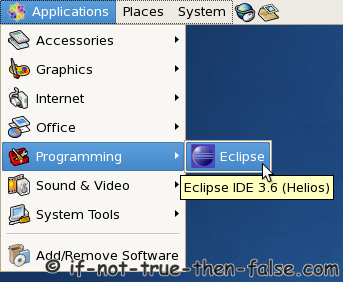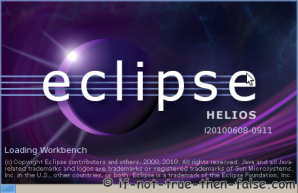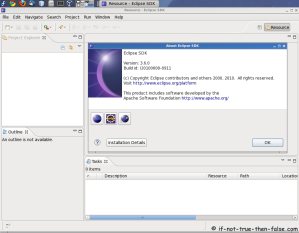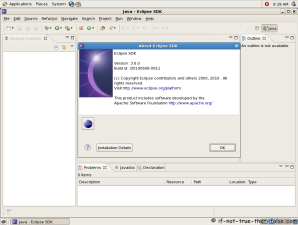This is guide, howto install latest Eclipse SDK 4.2.1 (Juno) on Fedora, CentOS and Red Hat (RHEL). This guide should work with Fedora 18/17/16/15/14/13/12, CentOS 6.3/6.2/6.1/6/5.8 and Red Hat (RHEL) 6.3/6.2/6.1/6/5.8 and even with earlier versions.
Eclipse is a multi-language software development environment comprising an integrated development environment (IDE) and an extensible plug-in system. It is written primarily in Java and can be used to develop applications in Java and, by means of various plug-ins, other languages including C,C++, COBOL, Python, Perl, PHP, Scala and Ruby (including Ruby on Rails framework).
Install Eclipse SDK 4.2.1 (Juno) on Fedora 18/17, CentOS/Red Hat (RHEL) 6.3/5.8
1. Install Sun/Oracle Java JDK 7 or Java JDK 6
Install Sun/Oracle Java JDK 7 on Fedora, CentOS, Red Hat (RHEL)
Install Sun/Oracle Java JDK 6 on Fedora, CentOS, Red Hat (RHEL)
Install Sun/Oracle Java JDK 6 on Fedora, CentOS, Red Hat (RHEL)
2. Download Eclipse SDK 4.2.1 (Juno)
Download suitable version from www.eclipse.org/downloads. This guide uses Eclipse Classic 4.2.1 version. Another popular versions are Eclipse IDE for Java EE Developers, Eclipse IDE for Java Developers and Eclipse for PHP Developers. Select also 32-bit or 64-bit version depending on your system.
3. Change root user
4. Extract Eclipse package (example to /opt directory)
5. Add read permissions to all files
6. Create Eclipse executable on /usr/bin path
7. Create Gnome desktop launcher
8. Start Eclipse 4.2.1
From command line use eclipse command
9. Eclipse 3.6 screenshots, running (and starting) on Fedora 13 32-bit and CentOS 5.5 64-bit
Troubleshooting
If you get something like following errors:
Failed to load the JNI shared library /usr/java/jdk1.6.0_21/jre/bin/../lib/i386/client/libjvm.so
Or
/usr/java/jdk1.6.0_21/jre/bin/../lib/i386/client/libjvm.so: cannot enable executable stack as shared object requires: Permission denied
Or
/usr/java/jdk1.6.0_21/jre/bin/../lib/i386/client/libjvm.so: cannot enable executable stack as shared object requires: Permission denied
Then do following:





Nice Post Thanks. If needs to install a full set of Oracle Java JDK, Eclipse & Ant then check out
ReplyDeletehttp://minimallinux.blogspot.co.uk/2012/06/centos-6-java-jdk7-with-eclipse.html
which covers all of these including browser plugins
Regards.
Hi Paul Thanks for the great Info..
Delete